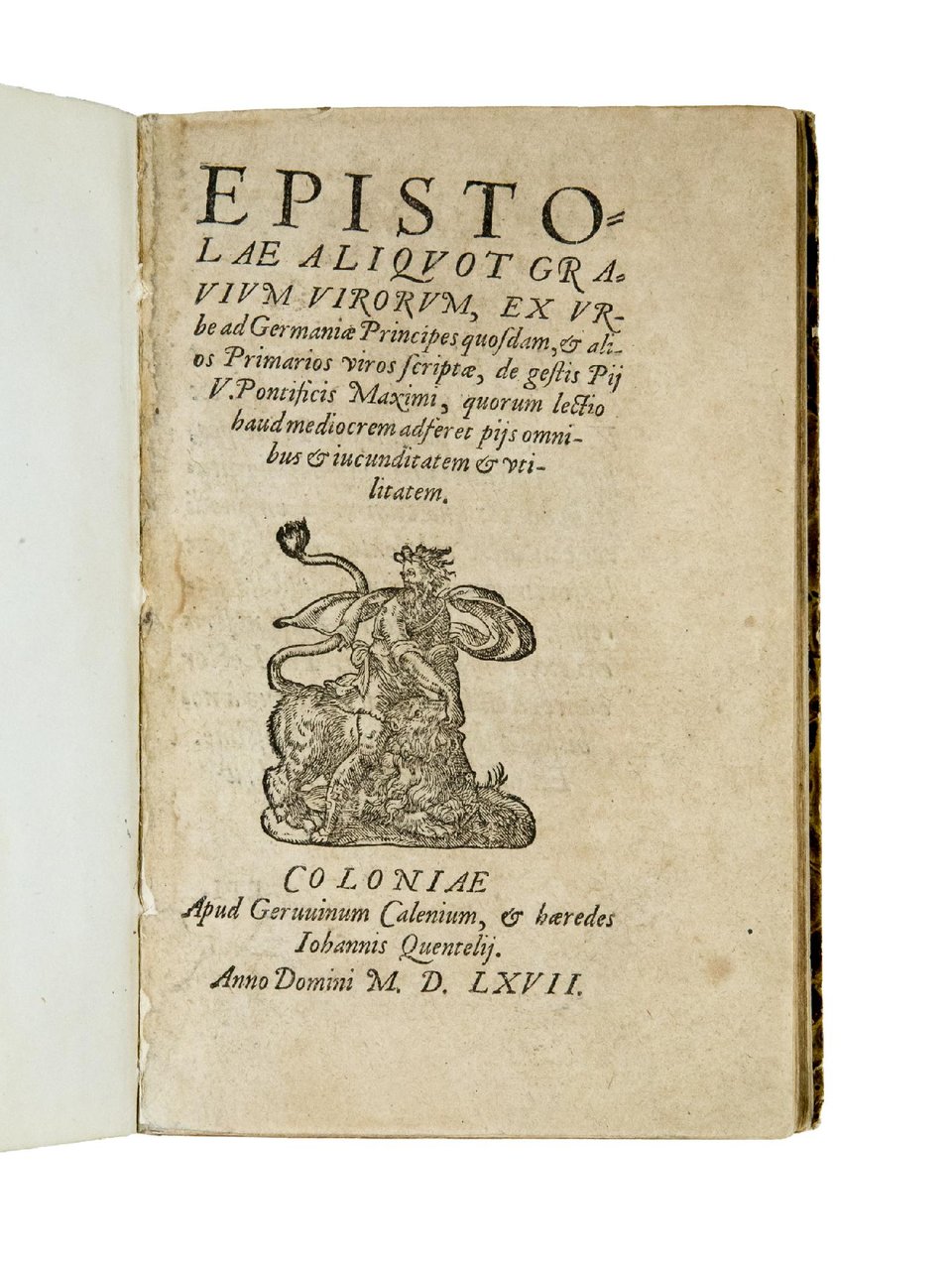Epistolae aliquot gravium virorum, ex Urbe ad Germaniae Principes quosdam, & alios Primarios viros scriptae, de gestis Pij V. Pontificis Maximi, quorum lectio haud mediocrem adferet pijs omnibus & iucunditatem & utilitatem
Epistolae aliquot gravium virorum, ex Urbe ad Germaniae Principes quosdam, & alios Primarios viros scriptae, de gestis Pij V. Pontificis Maximi, quorum lectio haud mediocrem adferet pijs omnibus & iucunditatem & utilitatem
Metodi di Pagamento
- PayPal
- Carta di Credito
- Bonifico Bancario
- Pubblica amministrazione
- Carta del Docente
Dettagli
- Anno di pubblicazione
- 1567
- Luogo di stampa
- Köln
- Autore
- EISENGREIN, Martin, ed. (1535-1578)
- Editori
- Gervinus Calenius & Heirs of Johannes Quentel
- Soggetto
- Ars Epistolica
- Stato di conservazione
- Buono
- Lingue
- Italiano
- Legatura
- Rilegato
- Condizioni
- Usato
Descrizione
8vo. 111, (1 blank) pp. a-g8. With the printer's device on the title-page. Half-cloth.
Adams, E-270; VD 16, E-807.
GREATLY ENLARGED EDITION of Eisengrein's collection of letters concerning the first two years of the pontificate of Pius V (Michele Gisleri, 1504-1572), with a new preface by the printer, Gervinus Calenius, dated Februry 28, 1567. An edition of only five letters had been published a year earlier under the title Nova fidedigna, de rebus, hoc anno, Romae a Rom. Pont. Pio Quinto gestis (cf. J. v. Pastor, History of the Popes, London, 1929, XVII, pp. 62 and 136).
The collection, which gathers letters or fragments of letters addressed by anonymous Germans living in Rome to German princes and notables, was later reprinted as a part of the biography of Pius V by Arcangelo Caraccia (Brevis enarratio gestorum sanctissimi pontificis Pii papae 5. ex processibus, et probatis auctoribus digesta, Roma, Guglielmo Faccioti, 1629). In the preface (p. XV) Caraccia states: “Qualia et quanta egerit in primo sui Pontificatus anno, ex quodam libello epistolarum Coloniae impresso Principibus Germaniae a quibusdam Germanis Romae commemorantibus scriptarum, liquido haberi possunt, quem ad verbum tanquam omnibus lectione dignum referre placuit”.
Michele Ghisleri was born at Bosco, near Alexandria (Lombardy). Being of a poor though noble family his lot would have been to follow a trade, but he was taken in by the Dominicans of Voghera, where he received a good education and was trained in the way of solid and austere piety. He entered the order, was ordained in 1528, and taught theology and philosophy for sixteen years. In the meantime he was master of novices and was on several occasions elected prior of different houses of his order in which he strove to develop the practice of the monastic virtues and spread the spirit of the holy founder. He himself was an example to all. He fasted, did penance, passed long hours of the night in meditation and prayer, traveled on foot without a cloak in deep silence, or only speaking to his companions of the things of God. In 1556 he was made bishop of Sutri by Paul IV. His zeal against heresy caused him to be selected as inquisitor of the faith in Milan and Lombardy, and in 1557 he was made a Cardinal and named inquisitor general for all Christendom.
In 1559 he was transferred to Mondovì, where he restored the purity of faith and discipline, gravely impaired by the wars of Piedmont. Frequently called to Rome, he displayed his unflinching zeal in all the affairs on which he was consulted. Thus he offered an insurmountable opposition to Pius IV when the latter wished to admit Ferdinando de' Medici, then only thirteen years old, into the Sacred College. Again it was he who defeated the project of Emperor Maximilian II to abolish ecclesiastical celibacy. On the death of Pius IV, he was elected pope, to the great joy of the whole Church.
He began his pontificate by giving large alms to the poor, instead of distributing his bounty at haphazard like his predecessors. As pontiff he practiced the virtues he had displayed as a monk and a bishop. In his charity he visited the hospitals, and sat by the bedside of the sick, consoling them and preparing them to die. He was very austere and banished luxury from his court, raised the standard of morality, laboured with his intimate friend, Carlo Borromeo, to reform the clergy, obliged his bishops to reside in their dioceses and the cardinals to lead lives of simplicity and piety. He diminished public scandals by relegating prostitutes to distant quarters, and he forbade bull fights. He enforced the observance of the discipline of the Council of Trent, reformed the Cistercians, and supported the missions of the New World. In the Bull "In Coena Domini" he proclaimed the traditional principles of the Roman Church and the supremacy of the Holy See over the civil power.
But the great thought and the constant preoccupation of his pontificate seems to have been the s


